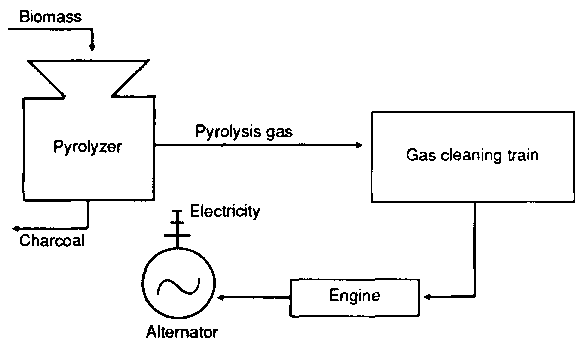

| Integrated Wood-Based Energy System |
In remote areas where electricity is unavailable and where other fuels are too costly, people meet their energy needs by using wood for fuel or to make charcoal, both of which are environmentally damaging. Charcoal kilns can cause serious air pollution. In response to this situation, the government of the Philippines is seeking to reduce deforestation by establishing tree farms using fast-growing Leucaena species.
The Forest Products Research and Development Institute in the Philippines is using the potential of the tree farms to develop a small-scale biomass energy system that provides rural areas with small decentralized electricity plants. The technology centres on a charcoal-producing kiln and is appropriate for areas where fuelwood is abundant and lump charcoal production is already an industry. Combustible waste gases emitted by the kiln during carbonization, which otherwise pollute the air, are captured, cleaned, and used with about 50% diesel fuel to run a power generator.
In a first system, four sets of charcoal kilns are used to generate the combustible gases and heat energy. The simplified second system adopts a biomass pyrolyzer that produces charcoal and combustible gases using agricultural wastes such as sawdust, rice hulls, coffee bean hulls, cocoshells, and wood chips. Both systems are backed up with a gas cleaning and cooling train and an electric generator run off a diesel engine.
The setup also generates byproducts such as better-quality charcoal, wood tar, and heat energy to operate a dryer. Ashes from the kilns are used as fertilizer. The system can also be adapted to run small buses, fishing boats, rice threshers, irrigation pumps, and small ice plants.
Prerequisites
An established source of agricultural and forestry wastes to supply the system and available technical support to operate the system. The annual fuel requirement to sustain the first system (charcoal production) is 2700 cubic metres of wood. It produces 200 tonnnes of charcoal per year, and can run a 12.5 kW electrical plant. The second system (biomass pyrolyzer) uses 20 kg per hour of agricultural wastes. It produces an estimated 9.6 tonnes of charcoal per year and can run a 12.5 kW power plant. The initial capital cost of setting up the plants is approximately Can $1600 for the charcoal kiln system, and Can $1400 for the pyrolyzer system. It is estimated that these costs can be paid back within 2-4 years.

Charcoal production
Potential users
Communities in remote regions without electric power, particularly where there is abundant wood from tree farms and where charcoal production industries already exist; small businesses or government services, such as rural hospitals and clinics; and villages requiring a reliable, low-cost energy system.
Contact
Dr Emmanuel D. Bello, Director Forest Products Research and Development Institute, College, Laguna 4031, The Philippines Tel.: (63) 2377; (63) 2586; (63) 2360 Telex: 40860 PARRS PM; Fax: (63) 94 - 3630

